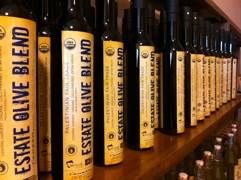Extending the Olive Branch
 Eight years ago, we met Nasser Abufarha. A PhD student at the University of Wisconsin, Nasser was originally from a village near where we lived called Jalame (for fans of our film Salt of the Earth, Nasser makes a cameo as the homeowner Sa'ed visits to discuss electrical work in the segment called The Wall). One of the results of Nasser's research was the Alternative Palestinian Agenda, a creative political approach to the Israeli-Palestinian impasse in which in place of the two-state or one-state solution was a multi-state solution where local regions would be classified as either Arab states or Jewish states in a patchwork which would be joined together in a confederation for national purposes.
Eight years ago, we met Nasser Abufarha. A PhD student at the University of Wisconsin, Nasser was originally from a village near where we lived called Jalame (for fans of our film Salt of the Earth, Nasser makes a cameo as the homeowner Sa'ed visits to discuss electrical work in the segment called The Wall). One of the results of Nasser's research was the Alternative Palestinian Agenda, a creative political approach to the Israeli-Palestinian impasse in which in place of the two-state or one-state solution was a multi-state solution where local regions would be classified as either Arab states or Jewish states in a patchwork which would be joined together in a confederation for national purposes.
Since then, I have followed Nasser's career with great interest. His dissertation was published under the title of The Making of a Human Bomb and is an incredible anthropological study of how suicide bombing came to be so prevalent a part of the Palestinian "resistance". From a Palestinian national identity so fundamentally shapes by the reality of dispossession (especially as a result of the 1948 war) originated a deep desire to find a rootedness. As dispossession has continued through subsequent wars, settlement expansion, "security"-based land confiscation, and the ongoing languishing of Palestinian refugee camps-cum-ghettoes, this desire to find rootedness in land (an important cultural heritage of the mostly agricultural Palestinian villages) became practically irrelevant. Along came another cultural value of self-sacrifice, and thus many found national rootedness and expression in the self- and other-destructive violence of suicide bombing.
 Five years ago, Nasser set out to do something about this issue in his own way by founding Canaan Fair Trade Company. In that brief time, the enterprise has grown impressively to encompass a wide variety of local products (olives, oil, spices, almonds, soap, etc.), many of which meet organic and fair trade standards around the world.
Five years ago, Nasser set out to do something about this issue in his own way by founding Canaan Fair Trade Company. In that brief time, the enterprise has grown impressively to encompass a wide variety of local products (olives, oil, spices, almonds, soap, etc.), many of which meet organic and fair trade standards around the world.
I had assumed that there was no connection between the two pursuits: academics and commerce. But for Nasser, they are intimately related. The olive tree, for Palestinians, is another rich source of cultural heritage. There is both a literal and a metaphorical rootedness in these ancient groves. And for Nasser, providing an alternative source of identity and national pride is probably even more important than the economic boost the farmers get for the fair (and timely) price for their produce. "The diplomats have taken Palestine off the maps, he says, "So we have put Palestine on the shelves." One farmer, interviewed by German television, put it this way: "Germany has BMW. Palestine has Canaan."

